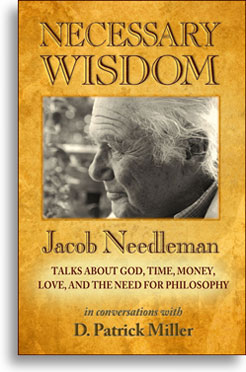
HOME • ASSISTED PUBLISHING • JOIN MAILING LIST
I N M E M O R I A M
Jacob Needleman
October 6, 1934 - November 28, 2022
________________________

Philosopher Jacob Needleman taught and wrote about the riches of the inner life for more than fifty years, giving a sophisticated but accessible perspective on the “big questions” of existence. A popular professor of philosophy at San Francisco State University who was featured on Bill Moyers’ “World of Ideas” series, Needleman’s most recent works include What is God? and An Unknown World.
One journalist consistently followed Dr. Needleman's career over many years: Fearless Books founder D. Patrick Miller. Since 1989 he conducted six feature interviews with Dr. Needleman on these subjects:
- Making Sense of Mysticism
- Understanding the American Soul
- The Secrets of Time and Love (read excerpt below)
- Money and the Meaning of Life
- Meeting God Without Religion
- Who Needs Philosophy?
Now you can read all these thought-provoking conversations in one volume: NECESSARY WISDOM.
___________________________________________
EXCERPT FROM “The Secrets of Time and Love” in NECESSARY WISDOM:
How much of the deprivation felt by modern Westerners can be summed up by the complaints “If only I had more time…” and “If only I felt more love…”? (Throw in “more money” and you’ve just about got all our habitual wants summed up.) If philosopher Jacob Needleman is right, we will not find more love in online dating services nor any extra time in a new iPhone app. Instead, we must turn these searches in on themselves to ask why we seek so incessantly for more of such immeasurables. By confronting our habitual desires and complaints, he suggests, we may pry open the door to the realm of the inner life — where both time and love reveal themselves not as problems to be solved but questions to be lived with.
“Such great questions cannot be answered with the part of the mind that solves problems,” writes Needleman. “They need to be deeply felt and experienced long, long before they can begin to be answered.” Yet it is in the very willingness to deeply feel and long experience the questions of time and love that we can begin to experience “enough” of both.
In this talk with D. Patrick Miller, Jacob Needleman explores some of the connections between these two great questions of human existence.
We tend to think that both time and love are elusive or actively evading us. You suggest that we really don’t need to search for either time or love, that what’s more productive is to examine the search itself.
NEEDLEMAN: Our relationship to time and love is conditioned by our state of being — our capacity to simply occupy our life, to be in touch with our real selves. The degree to which we’re not in touch with the real self is the degree to which we are frustrated and driven crazy by lack of time, or find ourselves turning round and round either searching for or avoiding love in a way that’s bitter and possibly degrading. The degree to which we are able to open to the real presence within — the “I am” or God within — is the degree to which we begin to have a human relationship to time and love.
It’s that inner relationship that provides us with a center of gravity, the basis of meaning for everything else. When you feel a search or hunger for that inner presence, then you have some basis for a truly human relationship between two people that doesn’t exist otherwise. To be supporting each other’s inward search is a basis for love that has not been widely written about or understood.You speak of sustained love as “a mystery in broad daylight.” The most obvious meaning of “sustained” is “over time.” How is the mystery of love sustained over time different from the mystery of falling in love?
NEEDLEMAN: When you fall in love, it happens all by itself. It’s not something you do deliberately, it more or less happens to you. There’s no resistance from aspects of yourself that want to go another way; you’re not struggling or trying to exercise your will or intention. There’s no reckoning of time, and you’re not aware of anything but the movement of falling in love.We all know from such experiences of passion that while we are with the person we love, time stands still as if it doesn’t exist. The sense of time that we’re used to involves the mind and thinking, and is at the service of fear, planning, and manipulation. Those aspects of the self are what ordinarily make time into an enemy, and makes us feel driven. Time re-enters the experience of falling in love only when fear comes back, when we begin to feel that we must hold onto the love, and don’t want to let go. Or we start worrying about how this new love will fit into the rest of our lives. Then time seems to exert pressure again. But in the midst of the bliss of love, the mind and its fears has no authority at all.
Sustained love has to do with struggle. The automatic gift of love that is given to us by nature begins to change by encountering resistance — where something comes in against it, an inevitability in any process of life. When resistance appears, intention is required. People who can’t make it past that point will go looking for another hit of automatic love; they’ll want to fall in love over and over again because it doesn’t require so much work. Because there always comes a point in the real love relationship when work is required, and that means working against all the impulses and distractions that we are heir to: other attractions, jealousy, sense of inadequacy, fear of responsibility, not to mention dealing with the simple day-to-day matters of life that can wear us down. These difficulties don’t appear all at once; they occur over time, and that’s why you must renew your intention many times to create sustained love.You’ve written that “the Self is everything that the ego pretends to be, and the Self has the time that the ego searches for in vain.” Is it only the Self that is capable of sustained love, and can the ego only “fall” in love?
NEEDLEMAN: No, I think there’s something in between the ego and the Self. Perhaps we could call it the noble part of the ego, that knows it has an unaccountable feeling in search of the Self. You might also call it the emerging soul. If the ego were completely insensitive, we wouldn’t have a chance because the ego rules us mostly. But in most of us, the ego at least has a hint that there’s something like the Self. That part of the ego struggles, and can have intentional love. The real Self doesn’t struggle, because its very essence is love and compassion. When that appears there is no struggle.
In the Buddhist mahayana tradition, compassion appears all by itself when the ego is overcome. You don’t have to develop it; it’s part of human nature. In between the worst parts of the ego and the glory of the Self, there is this intermediate principle that is searching for completion.Would you say then that we start falling out of love when the ego begins looking at its watch?
NEEDLEMAN: Absolutely. Every woman knows that when a man starts looking at his watch… There’s a saying in France that “love can withstand everything but a busy man.” There are a lot of forces that can weigh against love, but basically time is the sum of all these forces; it enters into everything.In your book about love you introduce an understanding of the philosophical stance known as Stoicism that differs from the popular notion that someone who is stoic is simply unfeeling or not admitting their suffering. How is real Stoicism related to time and love?
NEEDLEMAN: The basic idea of Stoicism is that we are essentially one with the great self, or Logos of the universe. That’s our true nature. We exercise that true nature by the capacity of the mind to relate consciously to its experiences — to accept, understand, or receive them without the preferences of liking or disliking those experiences, or responding with fear or craving. Nor does a true stoic try to reinterpret experiences, make them more or less dramatic, or good or bad. The stoic receives all experiences with an inner quiet.
This brings about a great inner freedom — the freedom of the person who is not devoured by emotional reactions. That doesn’t mean he doesn’t have these reactions; it means they don’t toss him around. It’s very wrong to think of a stoic as not caring. In fact the true stoic can act in a truly caring way because he’s less at the service of his own egoistic emotions.
We tend to think that if we are in love we should be devoured by emotion, or at the very least agitated to a high degree. Doesn’t passion mean that you can’t live without the other person? We want that total captivity. We may feel insecure if we don’t love that way, or don’t feel loved that way. But a stoic doesn’t love that way.
Perhaps the best popular icon we have for the stoic is the character Spock from the original Star Trek series. Why is Spock the most lovable figure from that show, the one who still touches fans the most? The idea about him was that he had no emotion, but in fact he had very strong feelings of loyalty, love, and justice. Captain Kirk was heroic too, but full of bombast and agitated emotions. And the other characters showed all kinds of neurosis. But Spock seemed to operate at a higher level, truly living by what he felt and believed without making a big show of his feelings. That’s what made him a lasting and beloved icon.It’s also interesting to remember that Spock was the bastion of integrity — incapable of lying or manipulating to achieve his aims, as Captain Kirk often did.
NEEDLEMAN: That’s right. The stoic literally lives for truth; he feels truth, love, and loyalty to the core but is not swayed by his own self-interest. This points up the difference between what might one call “real feeling” and egoistic emotion. We are so used to egoistic emotions that we’ve often forgotten what real feeling is like....
There's more to this interview! You can read the complete version (plus five more intriguing conversations about God, mysticism, the American soul, and much more) in NECESSARY WISDOM.
_________________________
Copyright 2013 by D. Patrick Miller. All rights reserved.